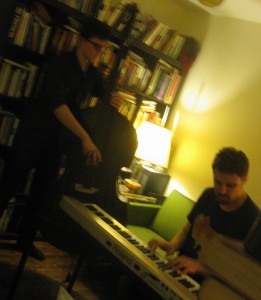The issue of “getting it right” is an important one in human life. This notion of “right” however, can be interpreted in a number of different ways, and it makes a great deal of difference how we understand this notion. It makes all the difference whether we “get it right” about “getting it right.”
If you give the clerk a $10 bill for an article that costs $3.99, the right change for you to receive is $6.01. If the clerk gives you $7.01 or $5.51, he has given you the wrong amount. In our small, day-to-day transactions, we often don’t notice or care about small mistakes like these. The same mistake in a larger transaction, however, makes a big difference. If the bank claims that I still owe them $70,100 dollars after I pay off $39,900 on my hundred-thousand dollar debt, that is a serious error. Fortunately, mathematics is there to guarantee unambiguously that the bank made a mistake, and it will thus be easy to demonstrate to the bank or anyone else concerned that the numbers need to be adjusted.
 (Incidentally, we shouldn’t be fooled by this issue of large and small transactions. In our day-to-day transactions, we often don’t care about a few cents missed here or there, but such matters of “small change” are in fact what astute business types rely upon to make fortunes. A single text message may only cost you a nickel, but that amount, which seems negligible when taken in isolation, is in fact added to a pile of millions and millions of other such small amounts, and it makes the phone company rich. You may consider a few pennies here and there “nothing,” but the phone company knows better. Similarly, the same bank that is responsible for calculating the state of your hundred-thousand dollar debt properly is, like the phone company, intensely attentive to the exact details of number, such that they calculate the exchange rate of a foreign currency to many decimal places: when they calculate the exchange on your U.S. currency, they do it precisely, not confusing an exchange rate of .98457 with a rate of .98332, though both are just “98 cents” to you.)
(Incidentally, we shouldn’t be fooled by this issue of large and small transactions. In our day-to-day transactions, we often don’t care about a few cents missed here or there, but such matters of “small change” are in fact what astute business types rely upon to make fortunes. A single text message may only cost you a nickel, but that amount, which seems negligible when taken in isolation, is in fact added to a pile of millions and millions of other such small amounts, and it makes the phone company rich. You may consider a few pennies here and there “nothing,” but the phone company knows better. Similarly, the same bank that is responsible for calculating the state of your hundred-thousand dollar debt properly is, like the phone company, intensely attentive to the exact details of number, such that they calculate the exchange rate of a foreign currency to many decimal places: when they calculate the exchange on your U.S. currency, they do it precisely, not confusing an exchange rate of .98457 with a rate of .98332, though both are just “98 cents” to you.)
In the case of such quantitative relations, it is clear what “getting it right” means, and, as we have seen, it is important to be mathematically precise. The same thing can be said of logic. Rather than dealing with number, logic deals with the relationship between claims. If I assert that “I will be there tomorrow unless it rains,” then I have committed myself to being there even if I break a leg or have a better offer from a better friend, provided tomorrow is not a rainy day. Of course, saying that I will be there doesn’t entail that I will be, but if I make this claim and then don’t show up I will correctly be criticized by my friends as someone whose word cannot be trusted.
In mathematics and logic, we have a clear version of what “getting it right” means. But though this is perhaps our clearest and most simple vision of “right,” it is neither the only one nor the most important one. There is nothing inherently wrong with this interpretation of “getting it right”; what is wrong is that this most “obvious” vision of “right” gets imported by us into other contexts where it is not appropriate.
In matters of skill, judgment, and art, the norm of “right” still operates, but “right” in these contexts is not a matter of the “correctness” that pertains in mathematical and logical relations.
 A skilled practitioner—a carpenter, perhaps, or a tailor, or a cyclist—knows “how to do it right” when cutting the wood or the cloth, or when pedalling or stopping. None of these practices, however, is a matter of counting the right number or establishing the correct relation of premise and conclusion. Relations of mathematics and logic are abstract in the sense that they are rules that apply unambiguously regardless of the circumstance to which they are applied. The practices of carpentry, tailoring and cycling, however, are not matters of working out the correct form of abstract relation, but are matters of engaging with the unique specificity of this wood and this chisel, this cotton fabric, this bumpy road. In each case, the skilled practitioner has the educated “touch” that allows her to be responsive to the specificity and to act in a way that is appropriate.
A skilled practitioner—a carpenter, perhaps, or a tailor, or a cyclist—knows “how to do it right” when cutting the wood or the cloth, or when pedalling or stopping. None of these practices, however, is a matter of counting the right number or establishing the correct relation of premise and conclusion. Relations of mathematics and logic are abstract in the sense that they are rules that apply unambiguously regardless of the circumstance to which they are applied. The practices of carpentry, tailoring and cycling, however, are not matters of working out the correct form of abstract relation, but are matters of engaging with the unique specificity of this wood and this chisel, this cotton fabric, this bumpy road. In each case, the skilled practitioner has the educated “touch” that allows her to be responsive to the specificity and to act in a way that is appropriate.
“The appropriate” is not the same as “the correct.” Both are matters of “getting it right,” but doing what is appropriate is far more demanding that identifying what is correct. Furthermore, there are no guarantees when trying to do what is appropriate, for one must exercise judgment—one’s active and meaningful engagement is essential and formative of the situation—and therefore one can fail. Matters of correctness come with a guarantee of exactitude, but this guarantee is won by at the price of a criterion of “right” that is far less meaningful, far less informative about the situation, and far less relevant to our actions.
Indeed, this notion of judgment is one of the most important in human life. It is good interpersonal judgment, not mathematical correctness, that will allow one to maintain one’s marriage when dealing with matters of money, or when responding to one’s partner’s sentences. It is good pedagogical judgment, not a mathematically correct knowledge of the textbook, that will allow one to teach effectively. It is good hosting judgment, not a mathematically correct knowledge of the practices recommended by “Good Housekeeping,” that will allow one to throw a great party.
 Something similar is true in matters of art. It is good artistic judgment and good taste that will allow one to “get it right” musically or sculpturally. Though the textbooks correctly indicate that any note of the Dorian mode may be played over a iim7 chord, a good musician relying upon her highly developed musical sense will make a better choice of which note to play than a novice practitioner who relies upon the rule. The note the novice plays is correct, but it is when the musician plays that we find drawn out of us the recognition that that was “just the right note” for the situation.
Something similar is true in matters of art. It is good artistic judgment and good taste that will allow one to “get it right” musically or sculpturally. Though the textbooks correctly indicate that any note of the Dorian mode may be played over a iim7 chord, a good musician relying upon her highly developed musical sense will make a better choice of which note to play than a novice practitioner who relies upon the rule. The note the novice plays is correct, but it is when the musician plays that we find drawn out of us the recognition that that was “just the right note” for the situation.
Rules of mathematics and logic are crucial to the successful navigation of adult life. And they are not absent from matters of carpentry, communication or music—indeed, it is virtually impossible to be successful in any of these areas without having embraced the norm of “correctness” at various levels, and having learned to interpret practical, interpersonal or musical situations correctly. It is also crucial, though, to recognize that correctness is quite a weak criterion of what is right, and that “getting it right” in all important affairs is fundamentally matter of judgment, that is to say, it requires a highly developed responsiveness, which is something that comes only with education and a highly cultivated attitude of caring for the situation in which one is engaged.


 Participants in these
seminars consistently have the experience of growth in their conversation and
conceptual abilities, and typically leave with a transformed sense of the nature
and possibilities of philosophy.
Participants in these
seminars consistently have the experience of growth in their conversation and
conceptual abilities, and typically leave with a transformed sense of the nature
and possibilities of philosophy.





2 Comments
I wonder if this might also be given the tag, “rules,” in that a good technical understanding of available “correct” choices (delineated by rules) might be drawn upon in their application, using one’s judgement. A musician, as you say, a choice of correct notes. A painter, a palette of suitable colours and so on.
As a master carpenter might say to an apprentice, “First you get good, then you get fast.”
and by “fast” I’m saying, metaphorically, “creative.”